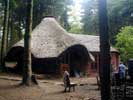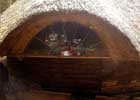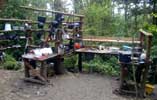
| [Homeless] | [EvoluLog] | [LiBaware] | [Search] | [GuestBook] |
Tinker's Bubble is a great example of a simple living community. In contrast to their upper-class neighbors with their huge houses and manicured gardens, the community uses just the resources they need. Formed in 1994 by a group of people with similar ideas of living off the land, there are now twelve adults and four children living under the trees on top of the hill. Owned by a cooperative the land consists 40 acres of woodland, pastures, and apple orchards. We learned of them by word of mouth, as they don't have their own website and they are not listed in the usual community directories.

  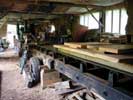
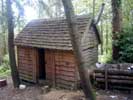 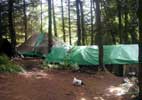  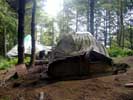 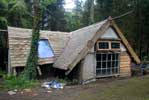 
Though the land is cooperatively owned, they do not share income, so everyone has to figure out their own means. They have to contribute around 20 pounds ($30) a week for the communal expenses, which include food. In addition to these expenses everyone commits to one and a half days of communal work per week (gardening, woodland work, building management, etc.) and one rotational "domestic" day when they wash dishes, do communal house cleaning, and cook (vegetarian) dinner for everyone. Because their weekly living expenses are so low they can easily earn this in one day's work. Many of them spend one day a week working on an organic market farm/store that a former member has started. Others work in offices of local non-profits. Others grow veggies or make crafts to sell at the weekly Farmer's Market in Glastonbury. In the winter there is often enough paid work for everyone on their own land. There is apple harvesting and juice pressing and woodland management including coppicing work and timber milling year-round. During our visit we worked mostly in the gardens, weeding and planting, even through the driving rain. 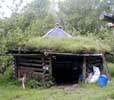   One of their biggest challenges over the years has been fighting for planning permission. They had to take their case to the High Court of Appeals and in the end they won with a five-year permission to erect their low-impact dwellings out-of-sight under the trees. One of the members, Simon Fairie, started an organization called Chapter 7 which was set up to help others in the fight for sustainable development. We had some good talks, but in our short one week visit we didn't end up getting very 'close' to more than a couple of people. Aside from the communal work day, the rain and the fact that people were busy doing their own thing, made it a bit difficult to make ourselves useful and we ended up with a bit of cabin fever - but we did enjoy our stay and it was great to meet the Tinkers a few weeks later in the Big Green Gathering. |
||||

